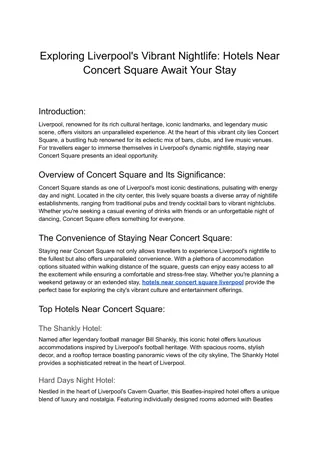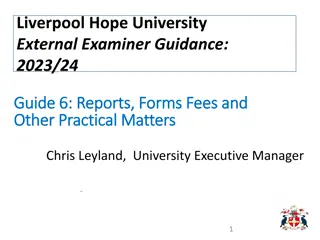Understanding Research Ethics at the University of Liverpool
Research Ethics at the University of Liverpool play a crucial role in ensuring the dignity, rights, safety, and well-being of human participants are respected and safeguarded. Ethical approval is mandatory for all research involving human participants, animals, their tissues, or data. Consent, privacy, confidentiality, and informed consent are key aspects of research ethics that researchers must adhere to. Respecting the rights and dignity of participants, legal frameworks, reducing risks, and creating better research outcomes are highlighted as essential elements of ethical research practices.
Download Presentation

Please find below an Image/Link to download the presentation.
The content on the website is provided AS IS for your information and personal use only. It may not be sold, licensed, or shared on other websites without obtaining consent from the author. Download presentation by click this link. If you encounter any issues during the download, it is possible that the publisher has removed the file from their server.
E N D
Presentation Transcript
Research Ethics Matthew Billington 0151 794 8290 ethics@Liverpool.ac.uk www.liverpool.ac.uk/intranet/research-support-office/research-ethics/
Research Ethics? Research Ethics is a world-wide set of principles governing the way any research involving interaction between the researcher and other humans or human tissue or data relating to humans, is designed, managed and conducted. In preparing a research project, the dignity, rights, safety and well-being of human participants must at all times be considered, respected and safeguarded. Research Ethics The application of moral rules and professional codes of conduct to the collection, analysis, reporting, and publication of information about research subjects, in particular active acceptance of subjects' right to privacy, confidentiality, and informed consent.
Research Ethics at University of Liverpool ALL research involving human participants, animals, their tissues or data (which, in addition to experimental and quantitative data, can include qualitative (descriptive) data, transcripts of interviews, etc.) MUST have ethical approval from a University of Liverpool-recognised research ethics committee. Research must not start prior to ethical approval being obtained. Retrospective approval cannot be given. Why Respecting the rights and dignity of human participants Legal frameworks and policies e.g. Data Protection Act, consent; Practicalities of reducing risk Protection Funders Creates better research Research that results in benefits and has minimal risk of harm is research that has been carried out in an ethical manner.
Research Ethics at University of Liverpool Research ethics approval is not required for: Research which does not involve human participants, their data/tissues (literature analysis). Secondary analysis of non-identifiable information. Secondary analysis of information freely available in the public domain.
Consent Consent is the central act in research ethics, in accordance with the University s key principles, researchers should ensure that every person from whom data is collected for the purpose of research, consents freely to the process on the basis of adequate information. Participants should also be made aware that they are free to withdraw or modify their consent at any point of the research taking place. Research staff and participants must be informed fully about the purpose, methods and intended possible uses of the research, what their participation in the research entails and what risks, if any, are involved. Step 1: The giving of information Step 2: The discussion, clarification and review of the information Step 3: Obtaining the person's written and/or verbal consent
Confidentiality The confidentiality of information supplied by research participants and the anonymity of respondents must be respected. When one person discloses personal information to another believing that it will be held in confidence, a duty of confidence and trust is created. 'The appropriate use and protection of patient data are also paramount. All those involved in research must be aware of their legal and ethical duties. Particular attention must be given to systems for ensuring confidentiality of personal information and to the security of those systems'. Providing anonymity wherever possible Safe storage of the data Restricting access to the research team
Risk Research proposals should be considered in the context of the risks of the project, this can be defined as the potential physical or psychological harm or stress to the participant or the researcher. When considering a research project the benefits needs to be maximised and the risks minimised. Risks and benefits should be explained to participant as part of the informed consent process. Psychological Harm Physical Harm Legal Harm Social and Economic Harm How to minimise risk Researchers can minimise the risk of a study by implementing research that includes a well informed protocol, assemble a research team with sufficient expertise, incorporate adequate safeguards, ensure participants autonomy is maximised and ensure the benefits are maximised. A well documented risk assessment should establish that the risks of your research are minimised.
Example Application Staff Project from the Institute of Psychology, Health and Society, which came to full committee review last year. Flagged to central full committee- interview/sensitive
Research Aims and Designs The research involved investigating drinking behaviours following periods of absence from drinking (e.g. Dry January) The researchers proposed to provide participants with a breathalyser and a smartphone app in order to record drinking behaviours. A questionnaire would then be administered to review the participant s perspectives against the data from the app.
Informed Consent The committee requested further information on how the consent process would look for the questionnaire element The committee recommended that a welcome page was added to the questionnaire which provided information on the study; and contained a consent box through which the participants could tick in order to access the rest of the questionnaire
Confidentiality The researchers originally proposed to make photocopies of participant's ID s/ passports for verification purposes as part of the breathalyser element of the study. The committee felt that this was unnecessarily collecting identifiable data which could later compromise confidentiality and anonymity. The researchers modified the research design to take a digital photograph of each participant.
Data Management The committee were concerned regarding the proposal to send breathalyser data to the USA from participant s mobile phones. The researchers made modifications to the proposals so that all participants were loaned a mobile phone with the app downloaded, meaning no identifiable information was being transmitted.
Risk The Committee recommended that as the study had the potential to cause distress to participants, a debrief sheet should be produced to provide further guidance and support resources to participants. The committee also suggested that the researchers prepare a procedure for managing participant distress. The researchers were asked to provide a lone worker risk assessment to cover the interviews which involved the researchers working alone with participants.


































